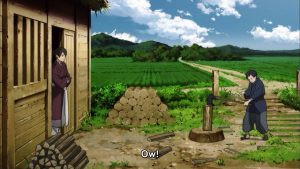 And so we reach the moment when Seirei no Moribito gets much more difficult to watch, though no less brilliant. This middle stretch of the series, almost entirely Kamiyama Kenji original material, does its job all too well. The past few episodes humanized Balsa, Chagum and Tanda and made them real and sympathetic to a degree rarely equalled in anime. Now, knowing that this idyllic period is over, things get much heavier. #12 is indeed the transitional episode for the entire series – the one where cracks began to form in the idyllic world Kamiyama worked so hard to build.
And so we reach the moment when Seirei no Moribito gets much more difficult to watch, though no less brilliant. This middle stretch of the series, almost entirely Kamiyama Kenji original material, does its job all too well. The past few episodes humanized Balsa, Chagum and Tanda and made them real and sympathetic to a degree rarely equalled in anime. Now, knowing that this idyllic period is over, things get much heavier. #12 is indeed the transitional episode for the entire series – the one where cracks began to form in the idyllic world Kamiyama worked so hard to build.
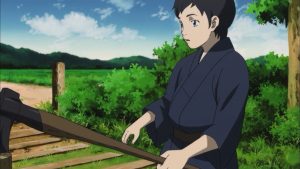 Episode 12 is also an important one in terms of the mythology underlying the fantasy element of Seirei no Moribito. As such it’s no surprise that Kawai Kenji’s haunting “Nahji no Uta” is its main soundtrack. This series remains unparalleled at portraying rural life in gorgeous terms, and the summer festival is certainly no exception. To call this “world-building” really doesn’t do it justice – it’s too mundane a term for what Kamiyama and team do. It all feels so real that you think she can smell the smoke of the bonfires and feel their warmth on your face.
Episode 12 is also an important one in terms of the mythology underlying the fantasy element of Seirei no Moribito. As such it’s no surprise that Kawai Kenji’s haunting “Nahji no Uta” is its main soundtrack. This series remains unparalleled at portraying rural life in gorgeous terms, and the summer festival is certainly no exception. To call this “world-building” really doesn’t do it justice – it’s too mundane a term for what Kamiyama and team do. It all feels so real that you think she can smell the smoke of the bonfires and feel their warmth on your face.
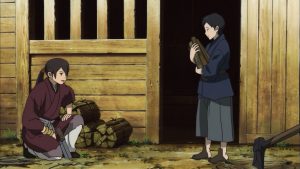 Chagum’s small act of rebellion here really shouldn’t have the repercussions it does, but this is not a just world Uehashi Nahoko has created. He’s only doing what he thinks is right – as usual – and trying to put a bully in his place. It’s also pretty clear that Balsa thinks she’d probably have done the same thing when she was a child, which is why she isn’t harder on Chagum than she is. But fate is fate, and what happens at the festival is the event that sets the rest of the narrative in motion. Along the way we get some wonderful interplay between Balsa and Chagum. He has a keen mind and a child’s curiosity, and as such not much gets past him – it’s a joy to see Chagum’s intellect working behind those steely eyes of his, processing what Balsa and his senses tell him and developing at a dizzying pace.
Chagum’s small act of rebellion here really shouldn’t have the repercussions it does, but this is not a just world Uehashi Nahoko has created. He’s only doing what he thinks is right – as usual – and trying to put a bully in his place. It’s also pretty clear that Balsa thinks she’d probably have done the same thing when she was a child, which is why she isn’t harder on Chagum than she is. But fate is fate, and what happens at the festival is the event that sets the rest of the narrative in motion. Along the way we get some wonderful interplay between Balsa and Chagum. He has a keen mind and a child’s curiosity, and as such not much gets past him – it’s a joy to see Chagum’s intellect working behind those steely eyes of his, processing what Balsa and his senses tell him and developing at a dizzying pace.
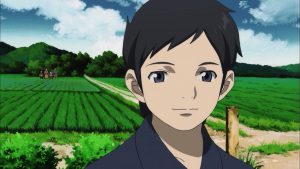 The fact is, if Balsa had, in the end, just decided to let the Rota boy Yassam (played by a young Ono Kensho) off the hook without keeping his promise, things would probably have turned out fine. But having seen what Chagum had done to defend the honor of his family – and score a victory in the process – her own sense of justice couldn’t let it stand. Maybe she liked saying “let the parents settle it” too. And settle it she certainly does, leaving things seemingly back to normal. But the last few seconds of the episode make it clear in no uncertain terms that this is not the case.
The fact is, if Balsa had, in the end, just decided to let the Rota boy Yassam (played by a young Ono Kensho) off the hook without keeping his promise, things would probably have turned out fine. But having seen what Chagum had done to defend the honor of his family – and score a victory in the process – her own sense of justice couldn’t let it stand. Maybe she liked saying “let the parents settle it” too. And settle it she certainly does, leaving things seemingly back to normal. But the last few seconds of the episode make it clear in no uncertain terms that this is not the case.
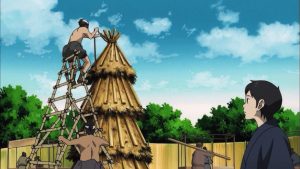 The snake in question makes his presence felt soon enough in Episode 13, as we reach the halfway point of the series. It would have been more straightforward if someone connected to the palace had seen Balsa or Chagum at the festival and recognized them, but this is more realistic, and it gives the series a chance to explore areas of Balsa’a character that we haven’t deeply explored before. Karbo (played by the very accomplished seiyuu (Ootomo Ryyzaburou, who brings great gravitas to the role) is considerably more than the “professional rival” she describes him as to Tanda.
The snake in question makes his presence felt soon enough in Episode 13, as we reach the halfway point of the series. It would have been more straightforward if someone connected to the palace had seen Balsa or Chagum at the festival and recognized them, but this is more realistic, and it gives the series a chance to explore areas of Balsa’a character that we haven’t deeply explored before. Karbo (played by the very accomplished seiyuu (Ootomo Ryyzaburou, who brings great gravitas to the role) is considerably more than the “professional rival” she describes him as to Tanda.
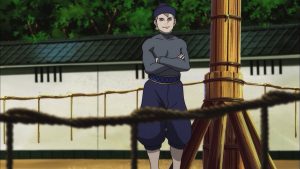 Balsa’s past is a constant presence in Seirei no Moribito, almost like a character in its own right. Karbo comes from a part of it that isn’t so dark, in truth – Balsa has already turned the corner in her life and made her promise to Tanda. But for a man like Karbo, being spared only deepens the humiliation of defeat (which I suspect with many of Balsa’s opponents stung especially because they were beaten by a woman). It seems she tormented him especially before she took him down and presumably freed the slaves whose caravan he was guarding, and he aims to pay her back in full using what he knows is her weakness – the welfare of innocents.
Balsa’s past is a constant presence in Seirei no Moribito, almost like a character in its own right. Karbo comes from a part of it that isn’t so dark, in truth – Balsa has already turned the corner in her life and made her promise to Tanda. But for a man like Karbo, being spared only deepens the humiliation of defeat (which I suspect with many of Balsa’s opponents stung especially because they were beaten by a woman). It seems she tormented him especially before she took him down and presumably freed the slaves whose caravan he was guarding, and he aims to pay her back in full using what he knows is her weakness – the welfare of innocents.
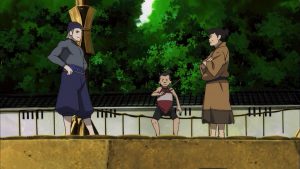 The teacher (Asagami Youko) and her pack driver (Yamaguchi Kappei, no less) are indeed innocent bystanders, but they’re the blunt instrument Karbo uses against Balsa. This is a showdown as fascinating in its own way as that with the swordsmith, and it culminates in a spear battle in a forest of bamboo that rivals Balsa’s fights with the Hunters in sheer visual magnificence. But the most significant part of this is what we can take away from it. Balsa reveals the truth of her situation to the travelers whose bodyguard she’s become – the teacher relates the story of a warrior who so lost himself in his quest for ferocity that he literally became the tiger he strove to be, and lost everything and everyone dear to him in the process.
The teacher (Asagami Youko) and her pack driver (Yamaguchi Kappei, no less) are indeed innocent bystanders, but they’re the blunt instrument Karbo uses against Balsa. This is a showdown as fascinating in its own way as that with the swordsmith, and it culminates in a spear battle in a forest of bamboo that rivals Balsa’s fights with the Hunters in sheer visual magnificence. But the most significant part of this is what we can take away from it. Balsa reveals the truth of her situation to the travelers whose bodyguard she’s become – the teacher relates the story of a warrior who so lost himself in his quest for ferocity that he literally became the tiger he strove to be, and lost everything and everyone dear to him in the process.
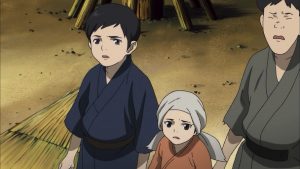 It seems to me that Balsa proves here she’s willing to break her vow and kill if that’s what she has to do to fulfill her role as Chagum’s protector. She may say all lives should be valued equally, but Balsa is a human being who has the capacity to love – she can’t weight Karbo’s kife equally with Chagum’s. Nevertheless, though she believes she has she doesn’t in fact kill Karbo – though just exactly what happens at the close of their battle is subject to some interpretation. Perhaps Balsa has become so strong as a warrior that she can strike a blow that destroys Karbo without taking his life – one that so thoroughly demonstrates the difference in skill that he no longer has the will the fight.
It seems to me that Balsa proves here she’s willing to break her vow and kill if that’s what she has to do to fulfill her role as Chagum’s protector. She may say all lives should be valued equally, but Balsa is a human being who has the capacity to love – she can’t weight Karbo’s kife equally with Chagum’s. Nevertheless, though she believes she has she doesn’t in fact kill Karbo – though just exactly what happens at the close of their battle is subject to some interpretation. Perhaps Balsa has become so strong as a warrior that she can strike a blow that destroys Karbo without taking his life – one that so thoroughly demonstrates the difference in skill that he no longer has the will the fight.


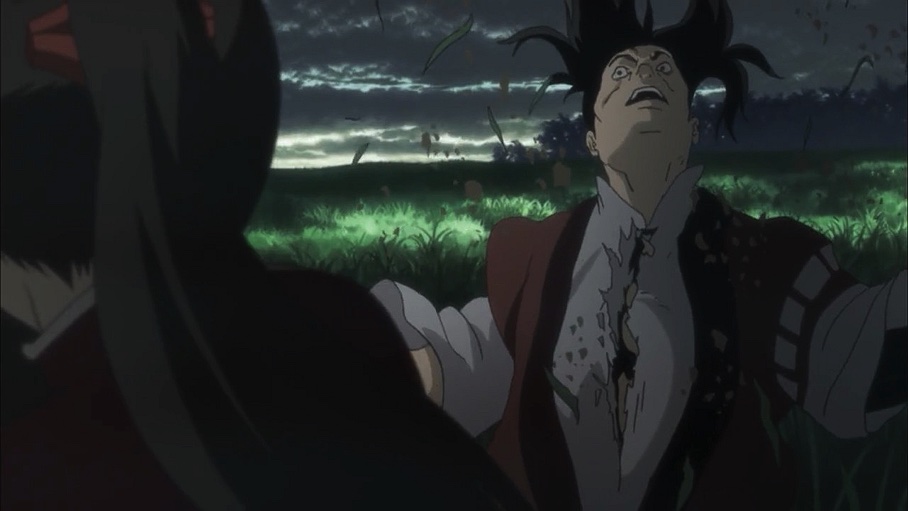
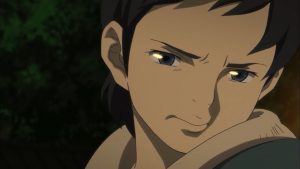

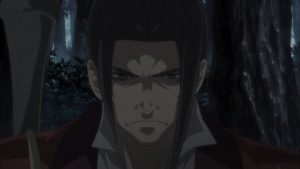
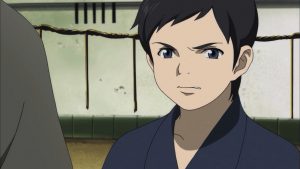
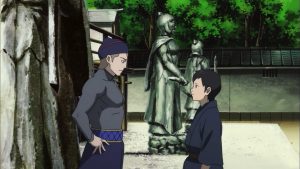
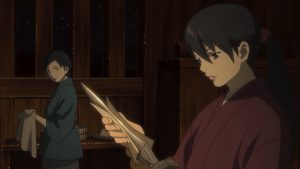
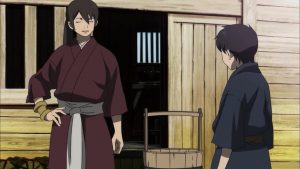
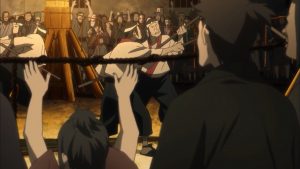
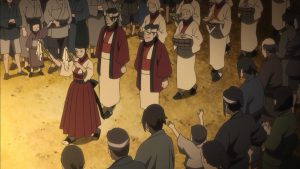

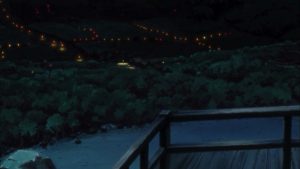
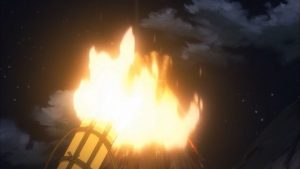
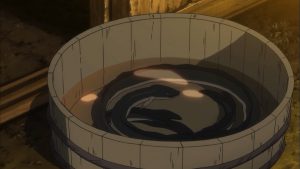
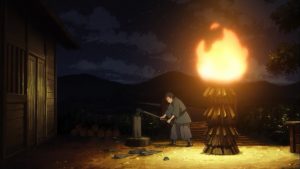
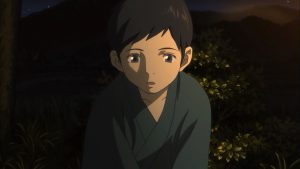
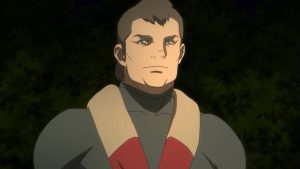
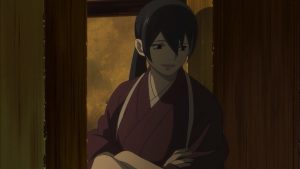
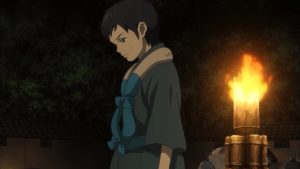
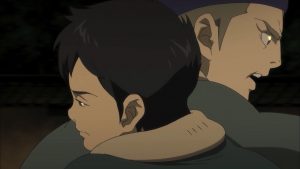
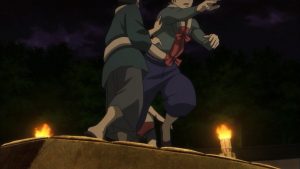
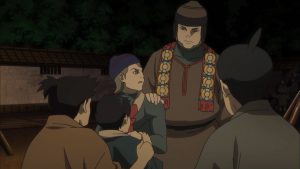
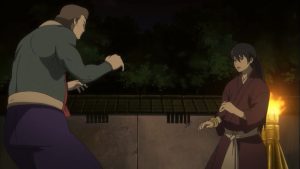
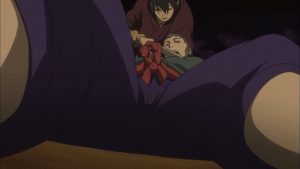
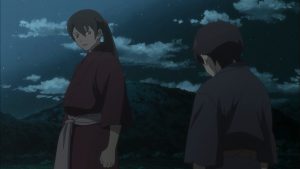
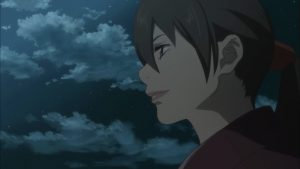
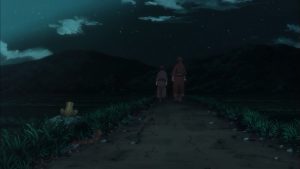
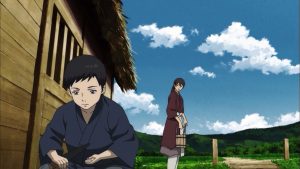
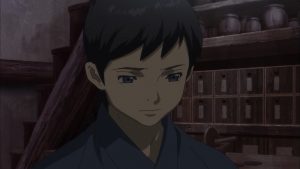
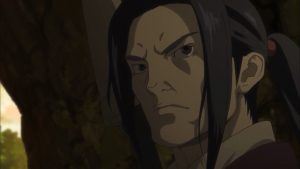
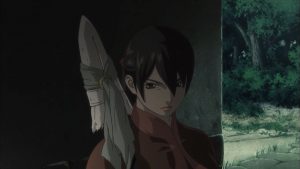
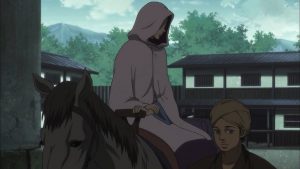
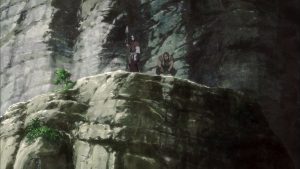
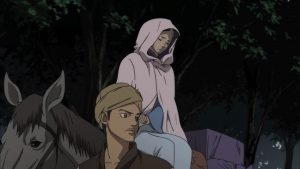
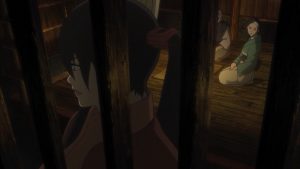
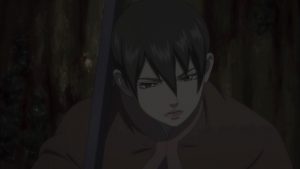
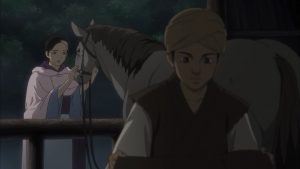
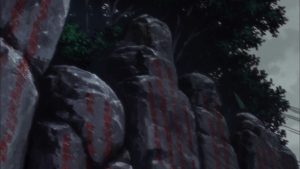
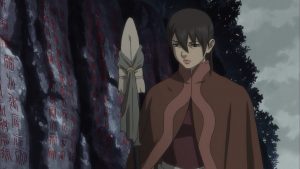
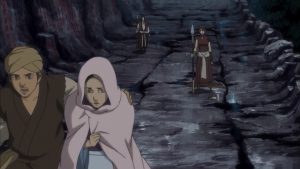
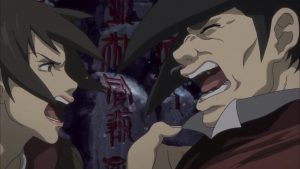
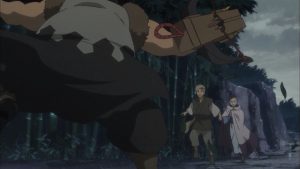
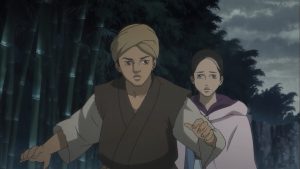
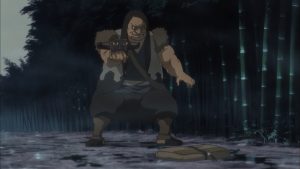
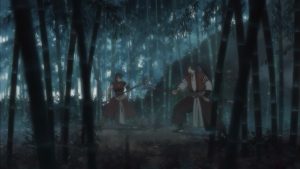
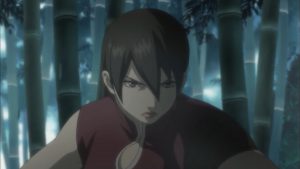
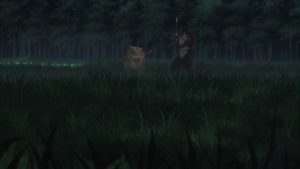
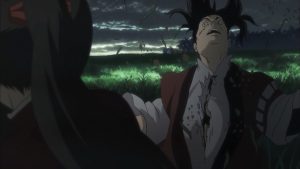
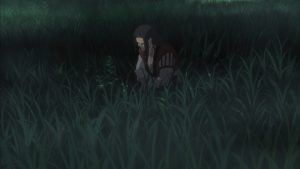

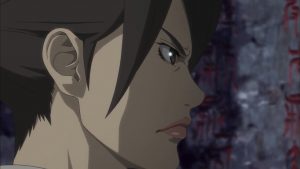
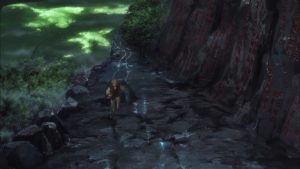


Panino Manino
June 16, 2020 at 10:36 amWatching for the first time you only really notice the analogy of the snake threatening the frog, but watching from a second time you may actually noticed that Balsa ruined everything spotting Karbo at the festival. All the noise from Balsa’s victory wakes Karbo from his sleep.
It’s hard to understand. She is so professional and competent all the time but this time she acts in the worst way possible. Chagum never promised not to go to the festival, she gave him plenty of room to slip out, she went there even tough she could have waited for him to return, and made a scene. It’s too many mistakes at once. And that torch was too close to their house!
But anyway, in the end this was a good thing, because this leads the arc of Balsa as warrior to it’s climax.
Remember episode 8? The sword-maker wanted to create a blade capable of “cutting the bonds of karma”. HE DID IT! He created such blade and for the “perfect warrior”, Balsa. While Karbo wanted to be the best warrior in the sense of it’s abilities, Balsa became the best warrior in the sense of the spirit. She became the real thing, the Tiger, a Noble Beast. If Balsa had not lost her patience and had fought just well enough to win, she would have probably killed Karbo. Would still be an acceptable decision, because while all “life” are equal, not all “live” is. But because lost her mind and conceded and let herself be her true self she was able to have a deeper victory, giving more than Karbo wanted to see and reached the agreement with him that she wished. She ended his “live” that could still harm others at the same time she spared his life. Her desire to save lives and not kill became so rooted on her mind that it’s part of her now. She doesn’t even need to think much about and try, that ideal became part of her.
Guardian Enzo
June 16, 2020 at 2:28 pmThat’s a good point about the swordsmith and the blade that could cut the bonds of karma – it does pretty much fit.
I more or less agree that it was Balsa’s decision to intervene that ultimately led to the house of cards collapsing, but for me it’s a stretch to say Chagum didn’t promise not to go to the festival. His silence was a de facto agreement to her request, I think. As for why Balsa did what she did, I felt as if she decided (unwisely, as it turned out) to risk it in the interest of trying to teach Chagum a life’s lesson. She wanted his courage and cleverness to be rewarded, and she wanted to show him that a warrior must always keep his word, especially in defeat.
Panino Manino
June 16, 2020 at 10:41 pmWhen Chagum makes a promises the clearly and explicitly says the promises. His silence was showing his unwillingness to make that promises.
In the end, we know that they can’t really stay together as a family as much as they want.
If they were never discovered the consequences would be big. Chagum is still with the egg, the egg will hatch eventually. If they were never discovered and had to go on a journey alone to deliver the egg without the help of the court they would probably fail.
It’s just how things needs to be.